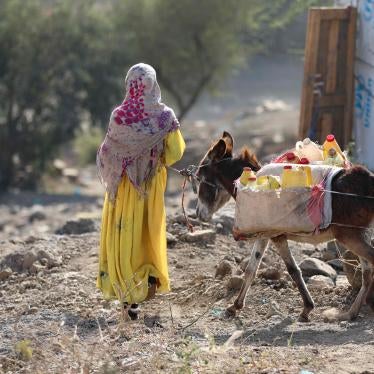(Beirut) – Houthi authorities have sentenced a human rights defender to death based on charges of espionage and “aid[ing] the enemy,” Human Rights Watch said today. They should quash the verdict and end their escalating repression of residents’ free expression and women’s rights.
On December 5, 2023, the Specialized Criminal Prosecution in Sanaa, which has been controlled by the Houthis along with much of northern Yemen since 2014, convicted and sentenced to death Fatima Saleh al-Arwali, a 35-year-old human rights defender and the former head of the Yemen office of the Arab League's Union of Women Leaders, on charges of collaborating with the enemy—in this case, the United Arab Emirates (UAE). She had no legal representation at the trial, and her family has only been able to contact her twice from detention since she was arrested in August 2022.
“Repression of human rights defenders and women’s rights activists in Houthi-controlled territories is reaching terrifying new levels,” said Niku Jafarnia, Yemen and Bahrain researcher at Human Rights Watch. “Instead of providing people in their territory with basic necessities such as food and water, the Houthis are suppressing human rights and freedoms.”
Human Rights Watch spoke with four people with firsthand knowledge of Arwali’s case and her detention conditions, including her brother, Mohammed, as well as a lawyer who tried to represent her, and reviewed court documents and other reports of her case.
The sources said that Arwali was arrested on August 12, 2022, while on her way from Aden to Sanaa, at a Houthi-controlled checkpoint entering al-Hawban district in Taizz. Her lawyer said she had just returned from visiting her mother in the UAE, where her family lives and she was born. She called her brother at the checkpoint to tell him that the Houthis had stopped her, and her family didn’t hear from her again until January 2023.
A letter to the Houthi foreign minister from United Nations special rapporteurs said the Houthi Security and Intelligence Service (SIS) forcibly disappeared her and provided no access to legal counsel, and she had only been able to contact her family twice since being detained. They said that “the Houthi authorities initially denied any knowledge of her arrest or whereabouts when asked by her lawyer.”
On July 31, Arwali’s lawyer learned that the Houthis had charged her with “aid[ing] the enemy [the UAE],” according to the official indictment issued by the Specialized Criminal Prosecution on July 31, which Human Rights Watch reviewed. The documents state that Arwali was “recruited to work with UAE intelligence officers who are overseeing and supervising the war and aggression on Yemen,” and that she “agreed to provide them with sensitive information and locations of the [Yemeni] army and popular committees.” The Prosecution did not offer any public evidence to support these charges.
Arwali has previously criticized Yemeni authorities on her social media account and had also regularly posted about women’s and children’s rights and child recruitment in the conflict between the Houthis and the Yemeni government, which is supported by the Saudi and UAE-led coalition.
Arwali's lawyer posted on social media on September 19 that at her initial hearing that day, she agreed to have him as her legal counsel. The lawyer told the judge that he was there to represent her, which she confirmed. However, when the lawyer asked Arwali to request a copy of her case and charges, an intelligence officer ordered him to leave the courtroom. He said that as he was leaving the courtroom, he heard the judge telling Arwali that “she will not need a lawyer and [the lawyer] can do nothing for her.”
One source said that since the Houthis took over Sanaa in 2014, “this happens regularly … when someone is arrested by the security and intelligence department, they bring them to the court and ask them to admit everything [and state that] otherwise they will torture them, so that he or she will confess to the charges.”
After that, the sources said, neither her family members nor any lawyers were able to get in touch with her before her trial on December 5. At the trial, the Specialized Criminal Prosecution sentenced Arwali to death, stating that she had confessed to recruiting people to support her in gathering intelligence for the UAE as well as impersonating another woman. It is unclear whether Arwali confessed and if so, under what conditions.
The last phone contact her family had with her, her brother said, was before the September hearing. “Her brother tried to visit her many times,” the lawyer said. “I wrote a letter for her brother to provide to the authorities, asking them to allow him to visit his sister, but the SIS kept refusing to allow her to meet anyone. They claimed that she didn’t want to meet anyone.”
Her lawyer said that her family submitted several official requests to visit her, including in December 2022 and March 2023, which Human Rights Watch reviewed. Though the chief prosecutor approved both requests, the intelligence service blocked the visits.
Due to the lack of communication, it is difficult to know what conditions Arwali faces in detention. Her lawyer said that at the September hearing, she said that she was being kept in a small, moldy room without a window. One person who was in the courtroom that day said she told the judge that her room was “so bad and moldy that I can't even pray in it.”
One of Arwali’s brothers was also able to briefly speak with her during the September hearing. Mohammed said that Arwali had told another brother that they had injected her with unknown substances, and she showed him bruises, saying she had been hit on her head. Mohammed said that his brother had said their sister “looked sick, exhausted, and weak. She might have lost 10-15 kilograms.” Mohammed added that his sister has diabetes, and that at the trial, Arwali asked whether her family could bring her medicine and money, but that the judge denied this request.
Human Rights Watch was not able to obtain further information about Arwali’s condition in prison. According to the report by the UN special rapporteurs, “it is not known under what condition Ms. Al-Arwali’s interrogations took place, nor how she has been treated while in detention.”
Many groups, including Human Rights Watch, have reported on systematic abuse in Houthi prisons. In their 2023 report, the UN Security Council’s Panel of Experts on Yemen found that “Houthi-held prisoners are subjected to systematic psychological and physical torture, including the denial of medical intervention to cure the injuries caused by the torture inflicted, which for some prisoners resulted in permanent disabilities and death.” They also found that detained women are “subjected to torture and other forms of ill-treatment … [and are] also sexually assaulted, in some cases subjected to virginity tests, and are often prevented from gaining access to essential goods, including feminine hygiene products.”
The “whole family is living through a very difficult time right now,” Mohammed said. “My mother … she is an old woman watching her only daughter be detained, tortured, and sentenced to death, and the family’s children are shocked by what has happened. The whole family is scared now about what will happen to Fatima, as well what will happen to us if we go home [to Yemen].”
According to Euro-Mediterranean Human Rights Monitor, the Houthis have sentenced 350 people to death since taking over the capital in 2014 and have executed 11 of them. On September 18, 2021, Houthi forces executed 9 people, reportedly including a 17-year-old, in Sanaa’s Tahrir Square. The UN High Commissioner for Human Rights said that “the defendants were sentenced to death in a judicial process that violated their constitutional rights and did not comply with fair trial standards under international law.”
The Houthis have also detained, forcibly disappeared, and abused scores of people, including perceived political opponents, students, journalists, and activists. Mwatana for Human Rights, a Yemeni civil society organization, has documented 1,482 cases of arbitrary detention and 596 cases of enforced disappearance by Houthi authorities between 2015 and April 2023.
International human rights standards, including the Arab Charter on Human Rights, ratified by Yemen, obligate countries that use the death penalty to use it only for the “most serious crimes” and in exceptional circumstances.
Human Rights Watch opposes the death penalty in all countries and under all circumstances. Capital punishment is unique in its cruelty and finality, and it is inevitably and universally plagued with arbitrariness, prejudice, and error.
“The Houthis are slowly making life unlivable for both women and human rights defenders in their territories,” Jafarnia said. “The Houthis should immediately give Fatima a fair trial and should end their widespread repression of women and human rights defenders in their territories.”









